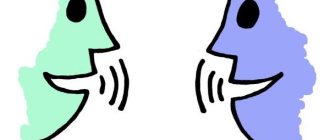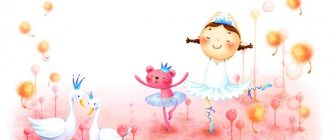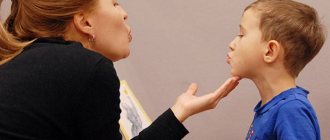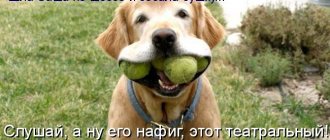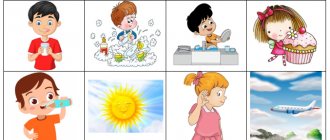Automation of sound
Exercises for automating the sound S: isolated, in syllables, words and sentences.
Automation of the sound of Sya begins with the easiest tasks for the baby.
Sing the “water song.” Say the sound Sya with a smile for a long time, on one exhalation: s-s-s-s...
Repeat straight syllables:
s-s-s-s-s-s-s-s.
Repeat the reverse syllables:
as-os-us-us-is-es-es-es-es-es.
Repeat the syllables where the sound S is between the vowels.
asi-ase-ase-asyu-asya usi-use-use-usyu-usya isi-ise-ise-isyu-isya axis-ose-ose-osyu-osya ysi-yse-yse-ysyu-ysia
Repeat straight syllables with consonant clusters.
sti-ste-sty-stu-sty sleep-spe-spy-spy-spy smi-sme-smo-smy-smy ski-ske-sko-sku-skya snya-sne-sno-snu-snya swee-swe-swe -syu-sya
Repeat the words where the sound S is at the beginning of the word.
Si: Sima, Simone, blue, sitting, sieve, siphon, blue, bruise, radiance, sitting, symphony, shine, blue, turn blue. Behold: hay, seven, family, seed, sowing, Senya, Seva, network, networks, sow, canopy, net, seeds, gray-haired, today, second, sow, family. Sho: Shoma, salmon. Su: suite, here. Xia: sit down, there and there. Confluence of consonants: poems, back, sleeps, snapshot, pig, pig, pork, pig breeder, retinue, wall, wall, flow, Stepan, steppe, snow, snowman, snowfall, laughter, change, sour cream, light, Sveta, shine, scheme , take off.
Repeat the words where the sound S is in the middle of the word.
Asya: Vaska.
Axle: string bag, pug, eighth.
Si: taxi, aspen, aspen, axes, spout, wear, geese, mow, Maxim, boletus, doggie, antennae, barefoot, Osip, bead, bead.
Is: letter.
Behold: autumn, eight, ash, song, songbook, Vasenka, insect, gazebo, hen, cassette, fidget, muslin, pouch, pool, hang.
Yes: braid.
Sho: that's it, ribbon.
Xiu: everywhere.
Sya: Asya, Vasya, goslings, Tosya, joint, oatmeal, ten, grandfather, grandmother, ten, carry, mow, knead.
Repeat the words where the sound S is at the end of the word.
Axis: axis, maybe.
Us: goose.
Ys: heights.
Is: inscription, signature, bend over. Yes: all.
Yus: I’m afraid, I wash myself, I wash myself, I get dressed, I get up.
Repeat words with two S sounds.
Sit down, seventy, lisp, demolish, mixture, laugh, whistle.
Repeat the phrases.
the goose family the eighth house blue ribbon crumpled fabric new suit
blue pouch thin aspen gray-haired grandfather aspen arbor blue bead
autumn day spring sowing steppe geese seven carriages school of geese
Repeat the proverb.
If only this laughter would be for everyone.
Repeat the sentences.
Three words: Asya washes the sieve. Maxim sows seeds. The dog eats sausages. The goose has goslings. Vasya is herding geese. Senya is carrying a letter. The aspen has boletus. Seva sings a song. Pigs eat oatmeal. Maxim walks barefoot.
Four words: Senya blows the whistle. Vasya is on the bus. The pig is sleeping on the hay. Grandma has ten geese. Asya has her mother's cassettes. Goslings are sitting on the hay. There is an inscription on Vasya's cassette. The light shines on the wall. Vasenka the cat is rolling beads. A sieve hangs on the wall. Senya's cat has a mustache. Grandpa has a blue pouch. The pug is sitting in the snow. There are seven sausages in the package. Grandma is sitting under an aspen tree.
Five words. The cat Vaska is sitting on an aspen tree. Today Seva is coming to visit. Asya's window has thin aspen. Vasya the cat walks through the snow. Asya brings home an autumn bouquet. My family is sitting in the gazebo.
Six words. Semyon has a lot of salmon in his nets. Asya and Tosya are traveling in a taxi. A hen sits in the entryway against the wall. Gray-haired grandfather Semyon has a lot of seeds.
Seven words. Neighbor Vasya goes to visit Maxim.
(based on the book by E. N. Spivak, automation of sound S)
Card index of games "Sounds S-S" Automation of sounds
Games for the development of phonemic awareness. Sound S, S.
Game "Clapping". Game option 1.
Ask your child to clap if he hears the S sound in a word.
Mix up words with the C sound in different positions (at the beginning, in the middle, or at the end of words). For example: telephone, boots, dad, fruit drink, book, rain, nightingale.
The child claps when he hears a word with the sound C (do not confuse the sounds themselves with and Сь - these are different sounds, although the letter is the same!)
If it is difficult for a child to hear the sounds in a word, then say the words in a drawn-out manner, for example mmmoooooorrrsss. This game teaches the child to distinguish different sounds in speech and develops phonemic hearing.
Option to complicate the game:
You can give the task to clap if you hear the sound C and stomp if you hear the sound C.
Game "Clapping". Game option 2.
Tell your child, “Clap when you hear the syllable Sa.” Next we say a sequence of syllables, for example: sa, na, sha, sa, for, ra, yes, sa, tsa, sa, la, cha. Does the child distinguish between the sound C and the syllable SA in the speech stream? Is it confused with other similar sounds? Children very often confuse the syllable sa with the syllables za or tsa, as well as with hissing syllables with the syllable sha. And it is very important for us to teach children to distinguish between these sounds and syllables. This is also important for teaching writing at school, so that the child does not confuse these sounds and the letters that represent them in written speech when he begins to write.
Game "Echo".
Repeat three syllables in a row, and the child should repeat them as an echo, that is, a little quieter than you say. If your child repeats three syllables easily, increase the number of syllables in the repetition chain. Be sure to praise and encourage the little “echo.” If the “echo” makes a mistake, repeat the chain of syllables again.
Examples of tasks:
- sa-so-sy
- as-us-is-as
- Sam-garden-sav,
- so-su-si-su
- asa-aso-asu-asy, etc.
Game "Guess what whistles?"
You will need two pictures - “pump” and “water flowing from the tap”. You can draw them yourself (schematically depicting the pump and tap). The main thing is that they are recognizable to the child.
Show your child a picture of a pump. Say: “The air coming out of the pump whistles like this: ssssssssssss. He whistles angrily sss!”
Show the second picture and say: “Water is pouring from the tap. The water whistles softly, sit like this.”
Ask the child to say how the water whistles (ss-s-s-s) and show the corresponding picture. Then ask him to imagine how the air whistles from the pump - sssss - and show the desired picture.
Next, say: “Now we are going to play an attentiveness game. If you hear the pump song - a solid sss sound - then pick up the picture of the pump. And if you hear the song of water - a soft sound - then pick up a picture of water.” You say these sounds separately (s-s-s-s-s-s-s-s), and the child picks up the desired picture. First the game is played with sounds, then with words. You say a list of different words in random order: door, nightingale, herring, frost, banana, hat, water, and so on. If the word contains “pump song - hard sound C,” then the child raises up the picture with the pump. And if the word contains the sound s - a soft sound, “song of water”, then you need to raise the picture with water. If there is neither one nor the second sound, then there is no need to raise the pictures.
Joke game with sound C "Confusion".
Children are asked to guess which words are mixed up and put them in their places.
Examples of confusion-jokes with the sound C (Author L. M. Kozyreva, from the book “Speech Development. Children 5-7 years old”):
- A carp lives in the forest. A pheasant swims in the river. (Correct - “A pheasant lives in the forest. A carp swims in the river”).
- They gave us a delicious robe for lunch. Alyonushka has a new salad.
- A polar cod was flying in the clouds. There was a seagull on the table.
- The pike perch has two pike perches (correctly – “the pike perch has two pike perches”)
A few more confusions of the famous author of poems for children A. Shibaev:
- In front of the children, painters paint a rat. (Not a rat, but a roof. Instead of the sound S, you need to put the sound Ш).
- They say that a fisherman caught a shoe in the river. But then he got hooked on the house. (Not a house, but a catfish)
- The lazy guy is lying on a cot, crunching and gnawing on his guns. (Not guns, but dryers)
- The lion drops his leaves onto the yellowed grass. (Not a lion, but a forest)
A few of my own jokes - confusions for activities with children:
- That's it, daughter! Beauty! My daughter has a long goat! (not a goat, but a scythe).
- At Anya’s house, the bowl lives, dances, plays and sings songs! (Not a bowl, but a bear. Another correct option for replacement is a pussy).
- Katya ate a tasty tooth. Katya's soup is sick. (On the contrary, I ate soup and got a toothache).
- There is an owl in the room. And there is a sofa sitting in the forest. (No. There is a sofa in the room, and an owl in the forest).
Children usually laugh when they hear a joke - confusion. But not every child can correct a mistake and unravel the confusion. If a child has speech impairments, then you often have to give a hint - “Which word is lost? Which word fits the meaning? The answer also begins with the sound m. This is a toy. Guess what this is?)
Games for automating the sound of C and S in words:
Game “Tails” (author of the idea - S.A. Maksakov)
Show your child a strip of paper and tell him that different words are hidden in it - encrypted. The words are all different, but they have the same beginning. We need to figure out what words these are.
An example of a task: hidden in a strip are words that begin with “ska.” What words are these? Tell your baby: “I’ll start, and you continue: ska-... (make-up), ska... (rolling), Ska... (zka), ska... (rub).” If it is difficult for your child to guess, draw a small picture in which you depict part of an object and ask him to guess what kind of object it is and what kind of word it is that starts with “ska”.
Another example for this game is words starting with “sa”: sa... (fly), sama, sleigh, scooter, Saratov, Sasha, Sanya, independent, Samarkand, lard, bag, samovar, boot, Savka, garden, garden , gardener, soot, carp, fireworks, net, saber, sausage, sardines.
If you find it difficult to find words for a certain syllable, then there is a good helper - a dictionary. Introduce your child to a Russian dictionary, show him how to find words in it, read to him about several new words starting with the desired syllable.
Game “Assemble a basket”.
I usually play Tails and other game variations a little differently. It is very important for preschool children to see clearly the results of their actions. But in speech there is usually no such visual result that can be seen or touched. This is why children love to draw, sculpt, and do various crafts, but do not really like speech exercises. Let's take this feature of young children into account. I came up with a special game technique for teaching speech and called it in my research “visual result of children’s speech.” Despite the complex name of the technique, it is very simple and interesting, and all children like it, getting them interested in completing the speech task. The essence of this technique is for the baby to see that his speech action leads to a visual, tangible and vital result.
Tell the children that the Old Man-Speech lost all the words from his basket and was very upset. How can I help him? The words are lost - scattered all over the world (or throughout the album) and need to be collected again into one basket. The basket contained words with the sound S. We need to find them among other words. This is a game situation in which we will use visual speech assessment. Let's see how in a situation with a basket we can organize a visual assessment of children's speech actions.
We draw a silhouette of a basket on a board or easel, which we will “fill” with words. The task is to fill the basket completely. This is how you fill the basket: As soon as you and your child come up with a word, draw this word in the silhouette of a basket (for example, it will be an oval) and paint it over (color the oval). It's as if we "put" the word in a "basket". Next, each word with the sound C adds another oval to the basket. The game ends when we have completely “filled the basket with words.”
You can take a real basket and fill it with “words” - cubes from a building set.
In this game you can give any tasks - put words with the sound S in one basket, and words with the sound S in the other. Or collect in a basket only words in which the sound C is in the middle of the word. Or only words starting with the syllable Sa.
Children usually remember well where the word each child came up with is in the basket, what color it is, and point with their finger: “I put this in.” And this is Svetino’s word.” If you play in pairs with a child, then he remembers well where your word is, and where his words are and “who put in more words.”
Game "Bag and Net".
This game was born to me unexpectedly during speech classes with preschoolers. I know that not all children are interested in matching words with sounds, but I wanted to make this activity fun for kids. But I really didn’t want to use competition for motivation (who can come up with the most words?) Why?
- Firstly, because some children in this competition are obviously at a disadvantage.
- Secondly, because there is too much competition in our lives, and too little cooperation.
So we started playing the “bag and net” game - a game that teaches everyone to do tasks together and enjoy the overall results together. And all the children began to like the exercise of matching words with sounds; moreover, the children continued playing with the bag and the net even after class.
How to play?
- We draw a rectangle with handles - this is our bag in which we will put groceries. Next we draw an oval with handles. This is our grid.
- Together with the children, we determine what sound the word “bag” begins with. Yes, from the sound S. This is a hard sound. Therefore, we will put products in the bag that have a hard consonant S in their names.
- What sound does the word “grid” begin with? Yes, from the sound S. This sound is soft. Therefore, we will only put words in the grid that have the soft sound S’ in their names.
- We begin to get ready for the trip and put the necessary things in a bag and net. The task is not to confuse what goes where. And have time to get ready for the trip and put items in a bag and net in 5 minutes. Let's set a timer.
Game options:
- You can give children a set of pictures that need to be placed in a bag, in a grid, while there are extra pictures that need to be put aside and do not need to be used in the game (since these words do not have given sounds).
- You can set the task differently, without pictures - come up with as many names as possible with the sounds C and Сь. We draw each word invented by a child or a group of children as a rectangle inside the outline of a bag or grid. And we complete the task - fill the bag and the net in a given time.
The children and I came up with more than 50 words in this game! I am always amazed at the activity of children in this exercise, I am surprised at how they want to “put” their word into a common grid or bag. At the end of the game we are happy that we were able to come up with so much together!!! By the way, another idea that is suitable for children aged 6 years and older. Before the game starts, ask the children how many words you can put in the bag and net together. Write down your expected outcome. Then compare. Show the children how many words they planned to find and how many they actually found. Usually children say that they can find 10, 15, 20 words. How surprised they are that they were able to select so many words as a whole group, two to three times as many! “We didn’t even expect it! “- that’s what they usually exclaim. And this is very important for building self-confidence in children, the idea that they can do a lot, even things they don’t know about themselves yet!
Here are the words for bags and nets on the topic “Products. Food”, which we collected all together. I admit that I didn’t even expect that our bag and net would be so full, there wasn’t even enough space! And the children were satisfied and happy with their success!
- The bag will contain: salad, soup, sauce, sausages, dried fruit, butter, cheese, spaghetti, cabbage, pickle, salt, sugar, pineapple, apricot, soufflé, plum, rice, prunes, asparagus, coconut, radish, lingonberries, currants, russula, pie, juice, cheesecakes, sour cream, kvass, fruit drink, beef stroganoff.
- The net will contain sausages, syrup, seeds, salmon, crucian carp, orange, herring, boletus, chanterelles, peaches, jelly, oatmeal, salmon.
Game "Guess what's in your hand."
Place in the bag an object or toy whose name contains the sound S (or the sound S, depending on the task). Give the bag to the child. Invite them to guess by touch what is in the bag. The child needs not only to guess, but also to correctly pronounce the sound in the name of this object.
Games for automating sound C in phrases.
Game "Come here"
This is a game for a group of children, but it can also be played in pairs. Then you need to show your child a re-enactment of how animals play such a game.
Option 1. Playing in a group.
The leader of the game stands away from the group of children. He calls one of the children to him, calling him by name. At the same time, he must come up with a word with the sound S. For example, the leader is Vasya. Vasya calls: “Lena, come here! I found the whistle! (that is, the child came up with what he found - an object whose name contains the sound C). Lena runs up to Vasya and figures out what she found and who she will call. Lena calls: “Katya! Come here! I found a pussy! Katya runs up and comes up with what she found. You cannot repeat words. Katya says: “Denis! Come here! I found a fairy tale! and so on. In the game you need to pay attention to the correct pronunciation of the sound. If the sound is pronounced incorrectly, then you still need to “find something,” that is, come up with another word with the sound C and pronounce it correctly.
Option 2. Staging.
If you conduct such a game with toys in an individual lesson, then tell your child how the toys once played the game “Come Here.” Offer to play the same way. Select toys with sound for the game: pussy, fox, dog, elk, sailor, Sasha doll and others. Next, pretend to play with toys. You speak for the first driver, and then the child plays, performing all the roles in turn. For example, the fox says: “Pussy! Come here! I found a sausage." The pussy runs up and calls the next toy: “Sailor! Come here. I found the wheel."
Game "Shop"
You will need toys or pictures with images of objects whose names contain the sound S (see the list of words with the sounds S and S at the beginning of the article). To “buy” a toy or picture in our store, you need to name it correctly, “pronounce” all the sounds and say where the sound C is located in a given word - at the beginning of the word, in the middle or at the end of the word. When pronouncing the name of an object, the sound C stands out a little, pronounced exaggeratedly, for example, “sssslon - the sound C is hard, stands at the beginning of the word”, “missssska - the sound C is hard, stands in the middle of the word”, “los'l - the sound C is soft, is located at the end of a word."
An example dialogue in the game is given below (the dialogue, of course, can be changed by adding other words with the C sound). Pay attention to the correct pronunciation of the sound With children in all dialogue lines between the seller and the buyer.
Note: This dialogue can be introduced when the child already pronounces the sound s quite well. Otherwise, the triple task of “pronouncing a sound correctly + conducting a dialogue + determining where the sound is in a word” will be too difficult for children.
- Hello!
- Hello! Please pass. What do you want to buy?
- Give me an elephant, please. How much does it cost?
— We have a secret in the store. If you guess the secret, you can get an elephant as a gift. Tell me, where is the sound C hidden in the word elephant?
— In the word “sssslon” the sound C is hard, it is at the beginning of the word.
- Right! Here is your elephant! Goodbye! We will be glad to see you again!
- Goodbye!
